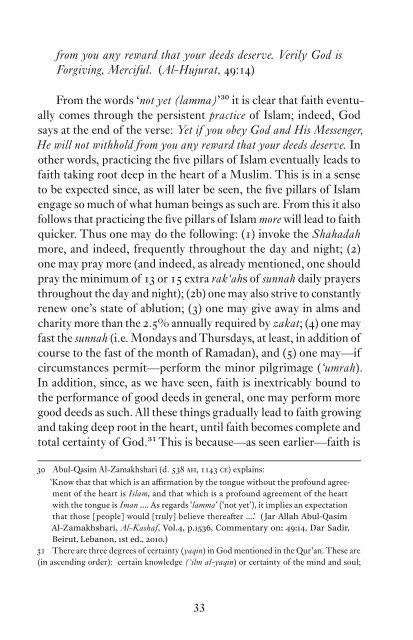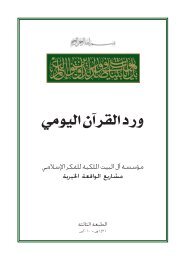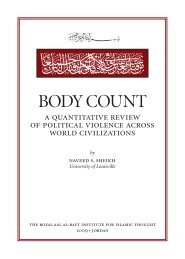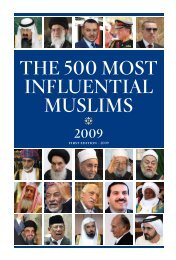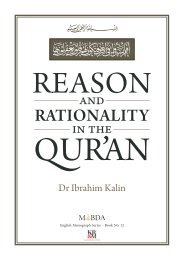Create successful ePaper yourself
Turn your PDF publications into a flip-book with our unique Google optimized e-Paper software.
from you any reward that your deeds deserve. Verily God is<br />
Forgiving, Merciful. (<strong>Al</strong>-Hujurat, 49:14)<br />
From the words ‘not yet (lamma)’30 it is clear that faith eventually<br />
<strong>com</strong>es through the persistent practice of Islam; indeed, God<br />
says at the end of the verse: Yet if you obey God and His Messenger,<br />
He will not withhold from you any reward that your deeds deserve. In<br />
other words, practicing the five pillars of Islam eventually leads to<br />
faith taking root deep in the heart of a Muslim. This is in a sense<br />
to be expected since, as will later be seen, the five pillars of Islam<br />
engage so much of what human beings as such are. From this it also<br />
follows that practicing the five pillars of Islam more will lead to faith<br />
quicker. Thus one may do the following: (1) invoke the Shahadah<br />
more, and indeed, frequently throughout the day and night; (2)<br />
one may pray more (and indeed, as already mentioned, one should<br />
pray the minimum of 13 or 15 extra rak‘ahs of sunnah daily prayers<br />
throughout the day and night); (2b) one may also strive to constantly<br />
renew one’s state of ablution; (3) one may give away in alms and<br />
charity more than the 2.5% annually required by zakat; (4) one may<br />
fast the sunnah (i.e. Mondays and Thursdays, at least, in addition of<br />
course to the fast of the month of Ramadan), and (5) one may—if<br />
circumstances permit—perform the minor pilgrimage (‘umrah).<br />
In addition, since, as we have seen, faith is inextricably bound to<br />
the performance of good deeds in general, one may perform more<br />
good deeds as such. <strong>Al</strong>l these things gradually lead to faith growing<br />
and taking deep root in the heart, until faith be<strong>com</strong>es <strong>com</strong>plete and<br />
total certainty of God.31 This is because—as seen earlier—faith is<br />
30 Abul-Qasim <strong>Al</strong>-Zamakhshari (d. 538 ah, 1143 ce) explains:<br />
‘Know that that which is an affirmation by the tongue without the profound agreement<br />
of the heart is Islam, and that which is a profound agreement of the heart<br />
with the tongue is Iman …. As regards ‘lamma’ (‘not yet’), it implies an expectation<br />
that those [people] would [truly] believe thereafter ….’ (Jar <strong>Al</strong>lah Abul-Qasim<br />
<strong>Al</strong>-Zamakhshari, <strong>Al</strong>-Kashaf, Vol.4, p.1536, Commentary on: 49:14, Dar Sadir,<br />
Beirut, Lebanon, 1st ed., 2010.)<br />
31 There are three degrees of certainty (yaqin) in God mentioned in the Qur’an. These are<br />
(in ascending order): certain knowledge (‘ilm al-yaqin) or certainty of the mind and soul;<br />
33


